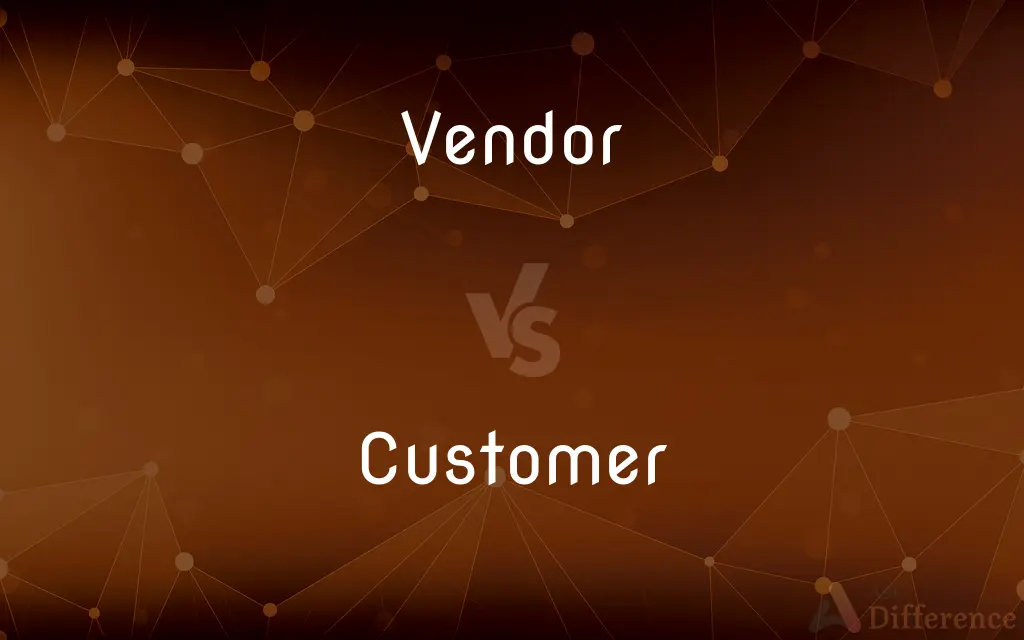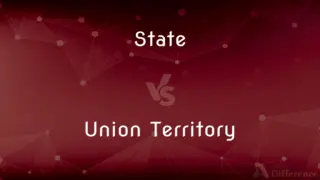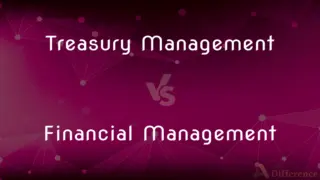Vendor vs. Customer — What's the Difference?
By Tayyaba Rehman — Published on October 28, 2023
A Vendor sells goods or services, while a Customer buys them. Vendor and Customer are two fundamental entities in the commerce ecosystem.

Difference Between Vendor and Customer
Table of Contents
ADVERTISEMENT
Key Differences
A Vendor, often synonymous with a seller or supplier, provides goods or services either to individuals or businesses. On the contrary, a Customer is an individual or entity that purchases or intends to purchase those goods or services. Both Vendors and Customers are crucial for the flow of commerce, ensuring that products or services move from those who produce or supply to those who consume or use.
While the role of a Vendor is to ensure the availability and quality of what they're offering, the Customer's role is to evaluate and decide on the purchase. Vendors aim to attract and retain Customers, often through marketing, quality assurance, and customer service. Conversely, Customers seek value, comparing offerings from various Vendors to get the best deal or quality.
It's worth noting that a single entity can be both a Vendor and a Customer. For instance, a retail store might be a Customer when purchasing stock from a wholesaler and a Vendor when selling to the end consumer. Such dynamics illustrate the complexity and interdependence of business relationships.
Another differentiating aspect between Vendor and Customer is the direction of cash flow. For Vendors, the primary objective is to generate revenue by selling products or services. For Customers, the flow is the opposite; they spend money to acquire what the Vendor offers.
Comparison Chart
Definition
An entity that sells goods or services.
An entity that buys goods or services.
ADVERTISEMENT
Primary Objective
To offer and sell products or services.
To evaluate and purchase products or services.
Relationship Direction
Provides goods/services to Customers.
Receives goods/services from Vendors.
Cash Flow Direction
Receives money from sales.
Spends money to make purchases.
Role in Commerce
Ensures availability and quality of offerings.
Seeks value and makes purchase decisions.
Compare with Definitions
Vendor
Vendors may provide post-sale support.
The Vendor ensured customer satisfaction with a warranty.
Customer
A Customer can be an individual or an organization.
The software firm became a significant Customer for the tech supplier.
Vendor
Vendor is an entity selling products or services.
The Vendor supplied the store with fresh produce every morning.
Customer
Customers are the recipients in sales transactions.
The Customer paid upfront for the bespoke artwork.
Vendor
A Vendor's objective is to generate revenue.
The Vendor offered a discount to increase sales.
Customer
A Customer is one who purchases goods or services.
The Customer gave a positive review after a pleasant shopping experience.
Vendor
A Vendor can be an individual or a business.
She became a Vendor at the local farmer's market.
Customer
Customers make choices based on value and need.
The Customer decided to buy the more energy-efficient appliance.
Vendor
Vendors offer goods in exchange for payment.
The software Vendor provided the company with the necessary tools.
Customer
In sales, commerce, and economics, a customer (sometimes known as a client, buyer, or purchaser) is the recipient of a good, service, product or an idea - obtained from a seller, vendor, or supplier via a financial transaction or exchange for money or some other valuable consideration.
Vendor
In a supply chain, a vendor, or a seller, is an enterprise that contributes goods or services. Generally, a supply chain vendor manufactures inventory/stock items and sells them to the next link in the chain.
Customer
A person who buys goods or services from a shop or business
Mr Harrison was a regular customer at the Golden Lion
Vendor
A person or company offering something for sale, especially a trader in the street
An Italian ice-cream vendor
Customer
A person of a specified kind with whom one has to deal
He's a tough customer
Vendor
One that sells or vends something
A street vendor.
A vendor of software products on the Web.
Customer
One that buys goods or services, as from a store or business.
Vendor
One that provides products or services to a business for a fee.
Customer
(Informal) An individual with whom one must deal
That teacher is a tough customer.
Vendor
A vending machine.
Customer
(obsolete) A habitual patron, regular purchaser, returning client; one who has a custom of buying from a particular business.
Vendor
A person or a company that vends or sells.
Customer
A patron, a client; one who purchases or receives a product or service from a business or merchant, or intends to do so.
Every person who passes by is a potential customer.
Vendor
A vending machine.
Customer
(informal) A person, especially one engaging in some sort of interaction with others.
A cool customer, a tough customer, an ugly customer
Vendor
To bundle third-party dependencies with the source code for one's own program.
I distributed my application with a vendored copy of Perl so that it wouldn't use the system copies of Perl where it is installed.
Customer
A native official who exacted customs duties.
Vendor
As the software vendor, to bundle one's own, possibly modified version of dependencies with a standard program.
Strawberry Perl contains vendored copies of some CPAN modules, designed to allow them to run on Windows.
Customer
One who collect customs; a toll gatherer.
The customers of the small or petty custom and of the subsidy do demand of them custom for kersey cloths.
Vendor
A vender; a seller; the correlative of vendee.
Customer
One who regularly or repeatedly makes purchases of a trader; a purchaser; a buyer.
He has got at last the character of a good customer; by this means he gets credit for something considerable, and then never pays for it.
Vendor
Someone who promotes or exchanges goods or services for money
Customer
A person with whom a business house has dealings; as, the customers of a bank.
Customer
A peculiar person; - in an indefinite sense; as, a queer customer; an ugly customer.
Customer
A lewd woman.
Customer
Someone who pays for goods or services
Customer
Customers often provide feedback to Vendors.
The Customer's complaint led to an improved product line.
Common Curiosities
What's the main objective of a Customer in a transaction?
A Customer seeks to obtain goods or services that meet their needs or desires.
Can a Vendor refuse service to a Customer?
Yes, but such decisions should adhere to laws, avoiding any form of discrimination.
How do Vendors attract Customers?
Through marketing, quality assurance, competitive pricing, and customer service.
Do Vendors always have physical products to sell?
No, Vendors can offer intangible services as well.
Do all Vendors provide post-sale support?
Not always, but many do to ensure customer satisfaction and loyalty.
Can a Customer become a Vendor?
Yes, if they have goods or services to offer to others, they can act as a Vendor.
Can an entity be both a Vendor and a Customer?
Yes, for instance, a retailer might buy from a wholesaler (acting as a Customer) and sell to consumers (acting as a Vendor).
What can a Customer do if they're dissatisfied with a Vendor's product?
They can return the product, provide feedback, or seek redress, depending on the Vendor's policies and consumer protection laws.
Why is the relationship between Vendor and Customer important?
It ensures the flow of commerce, with products or services moving from those who offer to those who consume.
Is a client the same as a Customer?
Often used interchangeably, but "client" may imply a longer-term or more personalized relationship than "Customer".
Share Your Discovery

Previous Comparison
State vs. Union Territory
Next Comparison
Treasury Management vs. Financial ManagementAuthor Spotlight
Written by
Tayyaba RehmanTayyaba Rehman is a distinguished writer, currently serving as a primary contributor to askdifference.com. As a researcher in semantics and etymology, Tayyaba's passion for the complexity of languages and their distinctions has found a perfect home on the platform. Tayyaba delves into the intricacies of language, distinguishing between commonly confused words and phrases, thereby providing clarity for readers worldwide.
















































